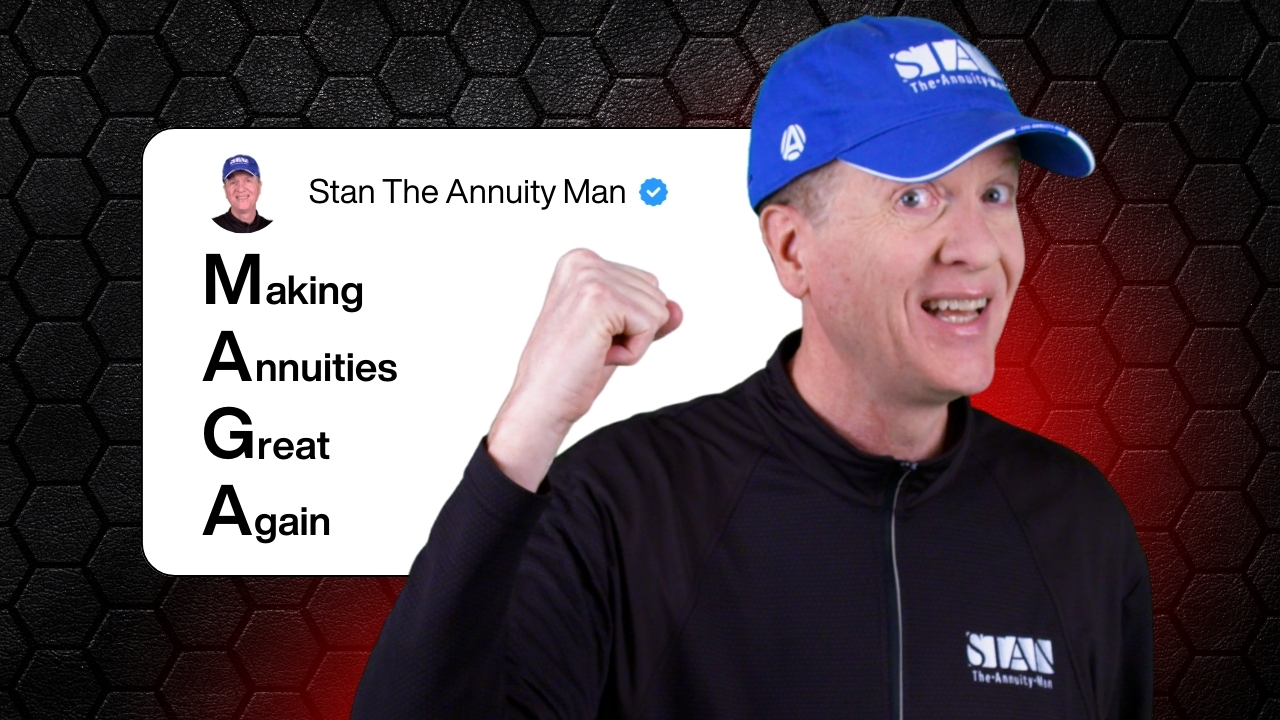Table of Contents
How to Buy an Annuity: What Age Is Too Old or Too Young?

I’m so glad you joined me for the continuing series of how to buy an annuity and know this isn't unveiled, sales pitch, bad chicken dinner seminar nonsense. We're doing a series on how to buy an annuity because we get a ton of questions. Today's topic on buying an annuity is what age is too old or too young to buy an annuity?
This is a great question, and I hope many advisors and agents are watching this because they need to know. Because we see a lot of annuities placed inappropriately, either with someone too young or someone too old. But I'm going to give you my opinion on what that means, what is too young and too old.
When You Are Young
What age is too old or too young, et cetera? Let's start on the too young side. I get a lot of calls from people in their 20s and 30s, and 40s about annuities. Ironically, most of the calls, I guess tragically, are a better word; most of the calls someone's trying to sell that 20-year-old or 30-year-old or 40-year-old an annuity of any type. The first thing I say is, "how old are you? " and they say, "well, I'm 35, or I'm 37, or I'm 40" or whatever.
Here's the bottom line. If you're less than 50 years old, you really shouldn't be looking at annuities of any type. Let me give you the reasons why. Suppose you're looking at a lifetime income annuity like a deferred income annuity or a single premium immediate annuity or qualified longevity annuity contract or an income writer, for that matter, attached to an index annuity. Remember that the lifetime income stream is primarily based on your life expectancy when you take the payment.
If you're young and looking for income to start pretty soon, I mean, that income amount that's going to be guaranteed is going to be low because your life expectancy is so long. You have to look at that. Interest rates play a secondary role in pricing; its life expectancy drives the income pricing train. From a lifetime income stream standpoint, if you're less than 50 years old, I'd instead keep your money in growth components, a growth market type of strategy that does not include any annuities.
Market Growth
Annuities for stock market growth should never be purchased for that. I know many variable annuity salesmen out there are yelling at the screen, but there are limitations on the choices within a variable annuity. Most of these variable annuities have high fees. If you're less than 50 years old, you have time for markets to be volatile, and then you can make up for any type of losses or volatility, etc. If you're less than 50 years old, you should never buy an annuity of any type.
Here's another reason. Our friends at the IRS say that if you take out money from an annuity, like a multi-year guaranteed annuity or a fixed index annuity, if you take money out before you're 59 and a half, there's a 10 percent penalty. Once again, if you're that young, you should not be buying an annuity of any type. Now, there are specific situations and asterisks that we deal with where there's a special needs situation that we need to create a lifetime income stream for, or there's a specific child or grandchild or someone, but those are one-offs.
If you're less than 50 years old, you really shouldn't be looking at annuities of any type.
When You Are Older
Now, let's talk about being too old. Annuities can be issued in some types, not all types. As far out as age 90, that didn't mean a nine-year-old should be buying them. Some product types have cutoffs at age 85. That doesn't mean you need to be buying but what I would like for you to do is if you're 80 or above, then we need to talk. I need to know why you are considering an annuity. What are you trying to solve contractually? What's the goal of the asset? Don't just go to the lousy chicken dinner seminar because they are giving away food. Always tell you if you're going to do that, swallow the food, not the sales pitch.
My mom, who's in St. Augustine, Florida, is a professional plate-liker. She goes to all these things, and she doesn’t buy anything because, in the end, they'll call her up for the appointment or they'll ask her for the appointment at the bad chicken dinner seminar. She’ll say, "Stan Annuity is my son, and they're like, "Oh my God, you're his mother." The bottom line is, if you want to eat their food, that's fine, but if you're 80 or above, I need to talk to you.
I need not because I don't think you're sharp as a tech because you are; you are probably more sharp than I'm. I need to understand the suitability. I need to understand the appropriateness. I need to understand what you're trying to achieve. Now it could be legacy; it could be long-term care, confinement care. It could be moral protection, or you might need a lifetime income stream to fill in that income floor gap that you might have. But I want to prevent anyone 80 and above is you not buying the sales pitch dream.
If It’s Too Good to Be True
You're not just being sold something. I'm trying to prevent someone from convincing you that the too good to be genuine product exists because it does. If it sounds too good to be confirmed with annuities, it is every single time without exception. If you're 80 and above, I need to talk with you. We might decide that this specific annuity type fits, or you don't need annuities at all. Don't listen to the sales pitches that you're getting out there.
We talked about 50 or less; we talked about 80 or older. Let's talk about 50-80. The people who are inside, that it is appropriate for them. That doesn't mean you need to buy one. Again, you need to make sure that you have specific goals contractually that you want that money that you're thinking about an annuity type to do, and we need to talk. Just remember 50 and 80, 50 and below, you're too young, 80 and above, we need to talk.
Never forget to live in reality, not the dream®, with annuities and contractual guarantees! You can use our calculators, get all six of my books for free, and most importantly book a call with me so we can discuss what works best for your specific situation.
.png)
.svg)












.jpg)


.jpg)
.jpg)
.jpg)
.jpg)

.jpg)



.jpg)
.jpg)
.jpg)
.jpg)
.jpg)
.jpg)
.jpg)


.jpg)
.jpg)
.jpg)
.jpg)

.jpg)
.jpg)


.jpg)

.jpg)

.jpg)

.jpg)
.jpg)
.jpg)

.jpg)
.jpg)
.jpg)

.jpg)
.jpg)
.jpg)


.jpg)







.jpg)

.jpg)

.jpg)



.jpg)
.jpg)

.jpg)
.jpg)
.jpg)
.jpg)
.jpg)
.jpg)
.jpg)
.jpg)
.jpg)
.jpg)
.jpg)
.jpg)
.jpg)
.jpg)
.jpg)

.jpg)
.jpg)
.jpg)

.jpg)
.jpg)
.jpg)
.jpg)
